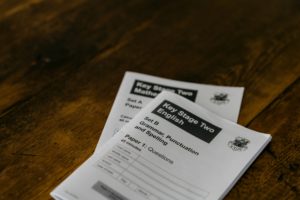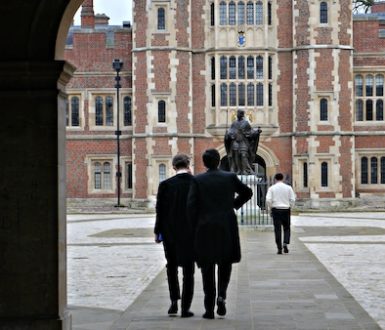The most common exams found in British schools

School exams in England and Wales
The English education system is unusual because it focuses on a few subjects from an early age. In English state schools, most children take GCSEs (General Certificate of Secondary Education) exams in only 9 subjects at age 16. The GCSE course takes 2 years. This means some subjects are dropped by age 13 or 14.
If the child hopes to go to university, the most common next step is A-Levels, which are usually taken at age 18. Most university degrees are only in one subject and A-Level choices are important for being accepted on a degree course. However, these A-Levels will often depend on GCSE choices (it would be difficult to do a History A-Level without a History GCSE, for example). With most people only doing 3 A-Levels, children must therefore start thinking about their degree choice even as young as age 12-13 (when GCSE choices are made).
The English system works well for children who are good at only a few subjects. It is not so good for children who don’t know what they are best at. This is why Wales is developing its own standards, with more focus on technology and creativity than the English system. The Welsh Baccalaureate qualification is part of this.
School exams in Scotland
In Scotland, there is a less rigid structure to exams than that found in England or Wales. It focuses on a wider spread of subjects, but with less depth.
From age 14, children take National exams. There are different types of National exam, depending on how difficult they are. Children can choose a mix to suit them. N3 is the easiest and N5 is the hardest. N3 and N4 are assessed in class by the teacher. N5 exams are set and marked by the Scottish Qualifications Authority (SQA). There are other qualifications available for less academic pupils.
After 16, students can choose exams called Highers, or they can do more Nationals. For very able children, there are exams called Advanced Highers.
Other common exams in Britain
- Common Entrance exam: Entrance exam for some senior independent schools. Taken at age 11 (mostly for girls’ schools) or age 13 (mostly boys’/mixed schools).
- 7+: Entrance exam for prep schools. Taken at age 7.
- 11+: Entrance exam for grammar schools. Taken at age 11.
- 13+: Late entrance exams for grammar schools or an alternative name for the Common Entrance exams.
- SATs: Exams that are used to get an idea of a child’s performance, compared with the average of that age group. Taken at age 10-11.
- CATs: Used to test for general intelligence.
- AS-Level: A short version of the A-Level.
- Pre-U: alternative to A-level used in many private schools.
- T-Level: Alternative to the A-Level, with a more technical focus.
- BTEC National, Tech Level, Level 3 Diploma or NVQ. Job-based qualifications, usually taken at 17-18.
- International Baccalaureate diploma: an international qualification. All students study a wide range of subjects.
- iGCSE: the International GCSE. The standards can be different to the GCSEs found in English/Welsh state schools.
- Welsh Baccalaureate (Wales only): This combines the Skills Challenge Certificate with other qualifications, such as GCSEs and A-Levels.
Note: You might also hear about the English Baccalaureate. This isn’t a qualification. Instead it is a group of GCSE subjects that are known to be suitable for most university degrees. For children who would like to go to university, but are not sure what they would like to do, it can be useful to study English Baccalaureate subjects at GCSE.
Image: Annie Spratt/Dreamstime



